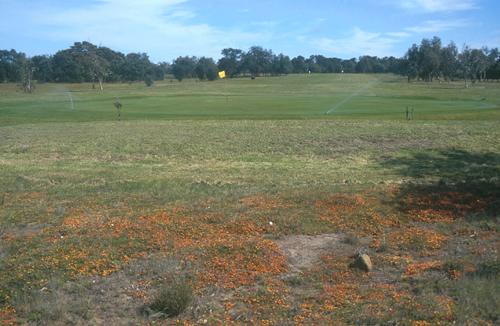
Campbell Town Golf Club is a nine-hole (par 70) flat course. There are bunkers on some greens and long, flat fairways. The rough is protected as it contains lowland native grassland dominated by Kangaroo Grass (Themeda triandra) with many rare varieties of orchids and at least 78 native species.
Corner Torlesse Street and Midland Highway Campbell Town, 70 km south of Launceston
Car park on Torlesse street. The golf course has a licensed bar and meals are available for groups
PO Box 58,
Campbell Town,
TAS,
Australia, 7210
Ph 03 6381 1209
The Campbell Town Golf Course was established decades ago, on a block of crown land leased by the municipal council. Before this, the block was used as a horse-track, cow common, and bicycle track. When the golf club applied to purchase the land in 1995, they readily agreed to a voluntary covenant that binds the club to managing the significant grassland vegetation on the course.
The vegetation of the golf course is in excellent condition with a high level of diversity. It contains 11 plants that are rare, vulnerable or endangered as well as a host of native grasses, orchids and other wildflowers. The endangered plants include a new species of leek orchid that has not been found anywhere else and another that only occurs in one small colony in Victoria. Such features make the golf course a unique place with very significant conservation values.
Wildflower displays in the golf course "roughs", a diversity of orchids, stray golf balls!
Conservation objectives will be met by continuing to manage the rough as a dry and open native grassland habitat. This will maintain or enhance the diversity of the flora and will ensure that the populations of threatened species will continue to thrive in perpetuity. The main management issues are frequency and timing of slashing, use of fire, application of fertilisers, irrigation, planting of shrubs and trees, and weed management.
Please check with golf course staff before walking on the course as you must not interupt play
Acacia dealbata, Acaena echinata, Ajuga australis, Arthropodium milleflorum, Arthropodium minus, Asperula conferta, Asperula scoparia, Astroloma humifusum, Austrodanthonia caespitosa, Austrodanthonia carphoides, Austrodanthonia laevis, Austrostipa mollis, Austrostipa stuposa, Banksia marginata, Bossiaea prostrata, Brachyloma ciliatum, Bulbine glauca, Bursaria spinosa, Caladenia anthracina, Carex breviculmis, Centrolepis aristata, Chrysocephalum apiculatum, Convolvulus erubescens, Craspedia aff. glauca "Tunbridge", Craspedia variabilis, Cynoglossum suaveolens, Dianella longifolia, Dichelachne crinita, Dichondra repens, Diuris chryseopsis, Diuris sulphurea, Drosera sp., Ehrharta stipoides, Einadia nutans subsp. nutans, Elymus scaber, Eriochilus cucullatus, Eucalyptus ovata, Eucalyptus pauciflora, Euchiton collinus, Geranium potentilloides, Geranium solanderi, Hakea microcarpa, Coronidium scorpioides, Hibbertia hirsuta, Hibbertia prostrata, Isolepis marginata, Lepidosperma curtisiae, Leptorhynchos squamatus, Leucochrysum albicans, Linum sp., Lomandra nana, Luzula meridionalis, Microtis parviflora, Microtis unifolia, Ophioglossum lusitanicum, Oxalis perennans, Pentapogon quadrifidus, Pimelea humilis, Plantago varia, Poa labillardierei, Poa rodwayi, Prasophyllum correctum, Prasophyllum olidum, Prasophyllum tunbridgense , Pterostylis cycnocephala, Pultenaea prostrata, Ranunculus sp., Schoenus absconditus, Schoenus apogon, Scleranthus biflorus, Scleranthus diander, Senecio glomeratus, Stackhousia monogyna, Thelymitra imbricata, Thelymitra pauciflora, Themeda triandra, Thysanotus patersonii, Wurmbea dioica